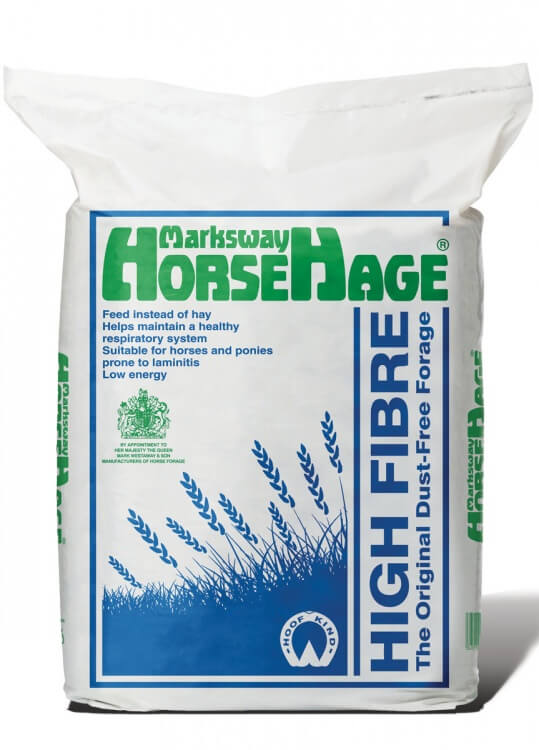
HorseHage High Fibre
High Fibre HorseHage is made from a selected mix of grasses that are high in fibre and lower in protein and energy levels.
As it is low in energy, High Fibre HorseHage is generally suitable for:
-
leisure horses and ponies,
-
native ponies
-
veterans
-
those that are resting, convalescing or prone to laminitis
It also provides an excellent fibre source for competition horses being fed high levels of concentrates.

Being particularly low in sugar and starch and high in fibre. High Fibre HorseHage and also Timothy HorseHage are suitable for feeding to horses and ponies prone to laminitis. This is indicated by the HoofKind logo on their packaging.
High Fibre HorseHage is made from the same ryegrass mix of grasses as Ryegrass HorseHage, but is cut at a later stage of growth, so that the resulting forage is lower in protein and higher in fibre.
HorseHage High Fibre is known by many of our customers as ‘HorseHage Blue’ because of its bag colour.
Appearance and aroma
HorseHage High Fibre is usually deep gold in colour with a coarser texture than Ryegrass HorseHage and has a pleasant, sweet aroma.
Find a stockist- Nutritional Information
- Composition
Nutritional Information
Typical Nutritional Analysis (on a dry matter basis):
- Protein 7 - 10%
- MAD Fibre* 34 - 40 %
- Calcium 0.4 – 0.6%
- Energy 7 - 10MJ/kg
- Starch 1 - 2%
- Dry Matter - 60%
* MAD Fibre – Modified Acid Detergent Fibre (This is a measure of the digestible part of the total fibre in a feed).
Composition
Ryegrass grass mix
Frequently Asked Questions
HorseHage High Fibre is generally suited to leisure horses and ponies in light to medium work who require a lower calorie diet, as well as those at rest or convalescing. It can also be fed to competition horses who are being fed high levels of concentrate and therefore require more fibre from their forage.
Yes, High Fibre is suitable for horses with laminitis or cushings as it has a lower energy and protein level. The particular fermentation process involved in making HorseHage reduces the amount of naturally occurring sugars in the grass therefore meaning it is considerably lower in sugar than other forages.
Typically, both High Fibre and Timothy offer the same energy level 7-10 MJ/Kg.

